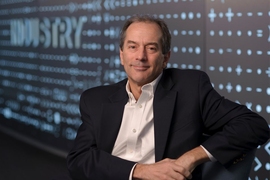In early January 2018, MIT professor John Lienhard opened an unexpected email. A panel of water industry professionals from around the world had ranked him fourth in the Top 25 Global Water Leaders list. The list was compiled and published by Water and Wastewater International (WWi), a publication dedicated to the distribution of practical knowledge for water system operators, wastewater engineers, and other professionals in the water industry worldwide. Its readership includes industry professionals either working in or consulting with water and wastewater systems and plants, researchers and educators, government and development agencies, industrial wastewater facilities, and environmental management organizations.
“WWi is one of many industry publications that I turn to to stay informed of the latest trends in water management, as do many of my colleagues from within and outside of academia,” says Lienhard. “Therefore it was an honor and a surprise to find my name included in this year’s list of influential leaders in the water sector.”
On the 2018 list, Lienhard was joined by influential individuals from across the globe who were recognized for their leadership in water innovation for the digital age. Among the recognized achievements were: developing an innovative urban storm water management strategy in Milwaukee, Wisconsin; building a biofuel production facility for algae harvested using wastewater in Spain; producing a global hub for the big-data-informed smart water sector to exchange information; leadership of the only water utility company to be named on the World’s Most Ethical Companies list for seven years running (Northumbrian Water); and many more.
Lienhard was recognized for the specific research-based water sector innovations that have come out of his lab in the Department of Mechanical Engineering. The Lienhard Research Group at MIT focuses on developing technologies for clean water through a wide variety of approaches, among them desalination, wastewater remediation, and water recycling, all while retaining the core objective of energy efficiency and reduced environmental impact. However, his influence on water innovation extends beyond this role. As director of the Abdul Latif Jameel World Water and Food Security Lab (J-WAFS) at MIT, he leads an Institute-wide initiative to cultivate new water and food systems research across fields and disciplines. This work is catalyzing innovation through grants, sponsored research programs, and other partnerships that result in real progress toward a future where the world’s water and food needs are met with a minimal impact on the environment.
While Lienhard was the only academic on the list, three others who were also nominated have a strong relationship to academia, and specifically to MIT and J-WAFS. Patrick Decker, CEO of Xylem Inc., was recognized for the way he is driving the company into the smart water space. Xylem’s business includes industry-leading brands that are used in water infrastructure around the world. The company invests in research and innovation in order to develop and distribute new technologies that will improve the way water is used, conserved, and reused in the future. J-WAFS is a key collaborator in this effort. In 2016, Xylem became J-WAFS’ first research affiliate through a three-year agreement involving sponsored research and support for J-WAFS activities and students at MIT. The sponsored research addresses challenges related to water contaminants, energy requirements for moving water, sustainability, and data analytics. The funding is also supporting a new generation of water innovators, through sponsorship of the MIT Water Club’s Water Innovation Prize and a J-WAFS graduate student fellowship.
“The global challenges of climate change, resource scarcity, and economic development for a growing population require research-based innovations in order to find new solutions,” says Decker. “The research affiliation with MIT, through J-WAFS, is allowing us to tap into a deep well of knowledge, cutting-edge facilities, and a culture of creativity to produce solutions at the vanguard of our field. This relationship shows the power of cross-sector collaboration to scope and solve these challenges.”
Research at MIT was also critical to the deployment of an advanced water sensing system in Singapore that has since become one of the digital water management strategies for which PUB, Singapore’s national water agency, was recognized. This water sensing system began through a collaboration between PUB and the MIT Center for Environmental Sensing and Modeling. The research collaboration was initiated and led by Andrew Whittle, the Edmund K. Turner Professor in the Department of Civil and Environmental Engineering, and the technology that emerged grew into the city-scale wireless sensor network now utilized by PUB Singapore to monitor water distribution by measuring water pressure, flow, and quality to track and prevent leaks, bursts, and other water loss. Harry Seah, PUB’s chief engineering and technology officer recognized by the 2018 Top 25 list, initially encouraged the project, along with and the institutional collaboration with MIT that made it possible. The technology launched a spinoff company, Visenti, which was purchased by Xylem in 2016. The sensors are now used in 25 cities worldwide.
At the top of this year’s Top 25 list is another familiar face at MIT: Carlos Cosín, CEO of Almar Water Solutions. Cosín is an agronomist and a well-known figure in the international water management community. He’s a good friend of MIT, following J-WAFS-supported research through multiple campus visits and through his company’s relationship with the Jameel organization, whose commitment to addressing the most significant problems facing mankind led to the gift that founded J-WAFS.
“MIT’s strength is creating basic research and translating it to innovations in technology that have broad societal benefits,” says Lienhard. “When our faculty and students bring this approach to the water sector, innovations abound, as is exemplified by our relationship to several of the water sector leaders recognized by the Top 25 list. The partnerships in industry and the public sector that J-WAFS has developed, and the research results that have occurred through Singapore-MIT Alliance’s relationship to PUB, show the important cross-pollination between academic research and industrial development. While the nominating committee named only one of MIT’s water researchers, I am proud to see our institutional influence on water sector advancements represented here.”










